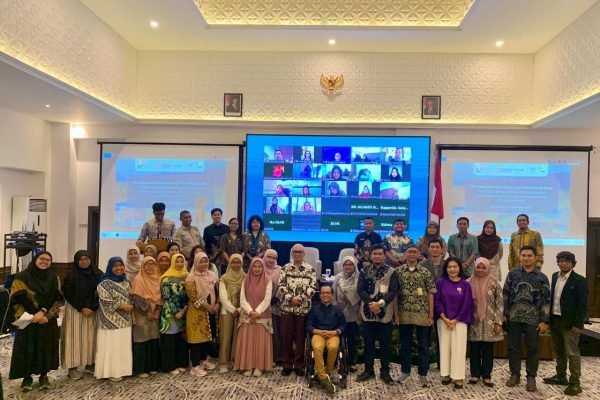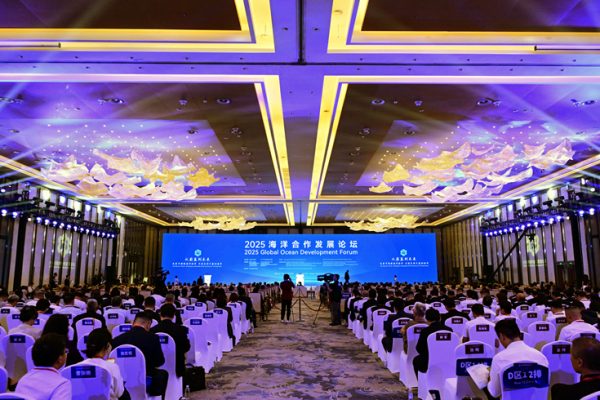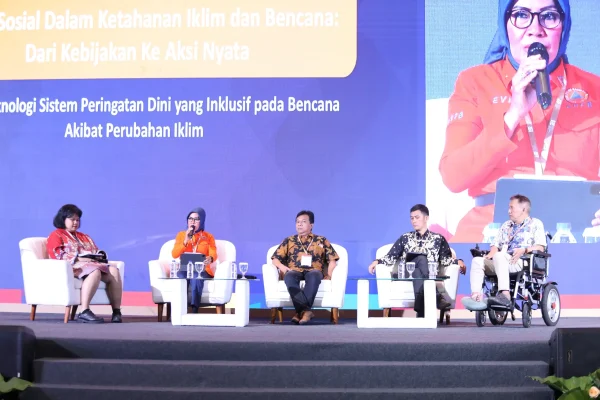On the first day of the National Dialogue held on 27 May, key stakeholders and resource persons—including (from left to right) Dr. Wahyu Marjaka, Director of NEK Governance at the Ministry of Environment and Forestry (KLH); Nasa U. A., Official Representative from the Kartamantul Region Office; Arif Wibowo, Country Manager at ICLEI Indonesia; and Selamet Daroyni, Senior Project Officer at ICLEI Indonesia, who served as moderator—gathered to share insights and discuss regulations related to the Urban Article 6 Initiative.
The launch of Indonesia’s international carbon market (IDX Carbon), grounded in Presidential Regulation No. 98/2021 and Environmental Ministry Regulation (Permen LHK) No. 21/2022 and aligned with the Paris Agreement, opens new pathways for global carbon cooperation. This initiative also creates innovative avenues for both national and sub-national governments to access climate finance, driving sustainable development across the country.
On 27–28 May 2025, the Yogyakarta City Government and ICLEI Indonesia hosted a National Dialogue on the Operationalization of Organic Waste Processing Technology under the Carbon Economic Value (NEK) Financing Scheme at Taman Pintar Yogyakarta. The dialogue served as a strategic milestone to explore alternative financing mechanisms for sustainable waste management in Yogyakarta City and the Kartamantul region (Yogyakarta, Sleman, and Bantul), while marking the completion of the Urban Article 6 pilot project in the region.
Funded by the German government’s International Climate Initiative (IKI), ICLEI Indonesia and Perspective Climate Research have collaborated since 2021 to support Yogyakarta in piloting urban climate actions under Article 6 of the Paris Agreement. The initiative led to the identification of a waste-to-energy emission reduction activity with potential for carbon market financing.

Clockwise from top left: Wawan Hermawan, Deputy Mayor of Yogyakarta, delivers welcoming remarks; Wahyu Marjaka, Director of NEK Governance at KLH, presents an overview of Indonesia’s carbon market mechanism; participants engage in a Q&A session on Day 1; and more than 20 key stakeholders gather in person on Day 1.
Opened by Wawan Harmawan, Deputy Mayor of Yogyakarta, the forum brought together a broad spectrum of stakeholders from the national government of Indonesia (GoI), local governments, private institutions, and academia to push forward the agenda on carbon-financed waste solutions.
“We are grateful for this initiative and hope it will strengthen collaboration among key stakeholders. Through this dialogue, we aim for Yogyakarta City and the Kartamantul region to be better prepared—technically, financially, and institutionally—to implement waste processing technologies and viable pilot projects in the near future,” he said, emphasizing the importance of regulatory understanding and project readiness.
The dialogue spotlighted local perspectives from Kartamantul authorities, Nasa U A, who outlined progress made on cross-jurisdictional waste management. Various efforts include partnering with stakeholders, enhancing operations at Waste Processing Units (UPS) and 3R-Based Temporary Disposal Sites (TPS3R), setting scheduled waste collection at Temporary Disposal Sites (TPS), introducing Refuse-Derived Fuel (RDF) and incinerator technologies, promoting household waste separation, and piloting incentive and disincentive mechanisms in waste management.
Regulatory frameworks enable cities to support Indonesia’s NDC targets through the carbon market mechanism
For the national perspective, key voices such as Dr. Wahyu Marjaka, Director of NEK governance at the Ministry of Environment and Forestry (KLH), presented in-person how Indonesia is tapping into emerging opportunities by aligning carbon trading mechanisms with greenhouse gas (GHG) reduction initiatives from relevant sectors.

Wahyu Marjaka, Director of NEK Governance at KLH, is seen presenting an overview of Indonesia’s carbon market mechanism on Day 1.
“Enabling carbon pricing in the waste sector requires close harmonization with relevant sectoral ministries to ensure its feasibility and sustainability. By ensuring waste supply readiness and strong governance, Yogyakarta has the potential to lead in implementing climate finance under Article 6,” he said.
Dr. Wahyu Marjaka further explained with Result-Based Payments (RBP) funds now reaching regions, including Yogyakarta, the GoI is making dedicated progress in localizing climate finance. The challenge is turning these carbon revenues into enduring and self-sustaining financial mechanisms.
Sharing lessons learned on Indonesia’s achievement of securing over USD 250 million in climate finance through RBP under Article 5 of the Paris Agreement, KLH underscored that upholding the environmental integrity of the national carbon market is vital. This depends on (1) reliable data, (2) rigorous social and environmental safeguards, (3) stringent prevention of double counting, (4) maintaining investor trust, and (5) the market’s long-term credibility.
Complementing this, Agus Rusly, Director of Waste Reduction and Circular Economy at KLH, highlighted regulatory frameworks supporting the integration of circular economy principles in local waste management to help achieve national emission reduction targets.
“Registering all mitigation actions, including emission reductions from the waste sector, in the National Registry System (SRN) through the national Emission Reduction Certification Scheme (SPEI) will ensure integrated data that supports E-NDC“ he said, noting that it is a crucial step towards enabling carbon financing.
Despite robust policies promoting circular economy integration to achieve net-zero emissions, public awareness and efforts to reduce waste at the source still lag behind.
PT PLN (State Electricity Company), represented by M. Bahrul Ulum, highlighted key regulations supporting the integration of waste-to-energy outputs into national renewable energy targets.
He stated, “The business model for developing Waste-to-Energy Power Plants (PLTSA) and electricity sales is governed by Presidential Regulation No. 35 of 2018.” This regulation outlines a three-party agreement where the regional government supplies the waste along with the BLPS/tipping fee, while the developer manages waste processing and signs a power purchase agreement (PJBL) with PLN, for a capacity under 20 MW at a tariff of 13.35 USD/kWh.
As Yogyakarta is not listed among the 12 priority cities in Presidential Regulation No. 35 of 2018, this presents both a challenge and an opportunity to develop tailored strategies that showcase the city’s potential for future initiatives.
Strengthening the intergovernmental coordination aspect, Heriyandi Roni from the Ministry of Home Affairs spoke on regional collaboration and governance mechanisms for accessing climate finance and enabling cooperation.
“Inter-regional cooperation may be initiated by regional governments or partner institutions, both domestic and foreign. The cooperation shall be facilitated by the Directorate General of Regional Administration II to ensure alignment with the national governance frameworks,” he said.
Leveraging local carbon projects through multi-stakeholder collaboration and business matchmaking
Findings from the two-year Urban Article 6 pilot, jointly conducted by Perspectives Climate Research (PCR) and ICLEI Indonesia, provided the research and policy backbone of the discussion—detailing the carbon mitigation potential of organic waste processing in the region.
PCR identified a biogas-based emission reduction scheme involving the use of biodigesters to process organic waste and generate renewable energy. With an initial capacity of 3,900 tons/year (10.6 tons/day), the project is estimated to reduce approximately 82,700 tons of CO₂ over 15 years. To increase the business feasibility, PCR also proposed a capacity up-scale of 42,000 tons/year (116 tons/day) with an emission reduction potential of 679,000 tons of CO2 over 15 years.
In terms of technical solutions, Aenergia, the technology provider, presented the readiness and scalability of its organic waste processing systems. Tailored to meet the distinct needs and challenges of its partners, Anaergia offers a diverse suite of solutions to local governments and activity developers.

In the picture, Ananda Laksmi from PT SMI and Hermawan from PT PII are seen delivering virtual presentations on financing strategies, held on Day 2 of the event.
On the investment front, Khusnul Khotimah from the Ministry of Investment (BKPM) outlined key pathways to attract foreign direct investment (FDI) for low-carbon infrastructure, showcasing a biogas project as a case study. The session discussed that biogas projects present medium-to-high risks due to complex documentation and procedural requirements. However, the sector offers significant incentives, including duty exemptions and tax allowances, which help mitigate investment risks and encourage development.
On financing strategies, national infrastructure institutions in Indonesia, notably PT Sarana Multi Infrastruktur (PT SMI) and Penjaminan Infrastruktur Indonesia (PT PII), shared investment mechanisms for waste-to-energy Projects for Yogyakarta city.
Ananda Laksmi from PT SMI presented public-private partnership (PPP), blended finance options, and project structuring mechanisms tailored for waste-to-energy projects. In parallel, Hermawan, Senior Vice President at PT Penjaminan Infrastruktur Indonesia (PII), elaborated on risk mitigation tools to ensure investor confidence in waste infrastructure ventures.

In the picture, Erin Danford from PCR and Julia Beerhues from Atmosfair are seen discussing with the moderator, Femme Sihite, Project Officer from ICLEI Indonesia, and participants during the Q&A session on Day 1.
To complete the value chain, carbon market actors such as Atmosfair and EcoSecurities shared perspectives on demand for city-scale carbon credits, underlining the growing interest from international buyers.
Julia Beerhues from Atmosfair expressed her support during the Q&A session, stating, “Though we are still assessing the potential of projects under the voluntary carbon market of Article 6.4, we are happy to support initiatives in countries where implementation is still at an early stage.”
Concluding the two-day insightful dialogue, Arif Wibowo, Country Manager of ICLEI Indonesia, expressed support for advocacy efforts in local-national governance and international involvement to ensure the feasibility of innovative financing in addressing climate challenges at the local level.
The multi-level dialogue ultimately marked a critical convergence of national policy, local implementation, and global climate finance. By providing both technical clarity and actionable pathways, the forum catalyzed a new wave of multi-stakeholder partnerships—positioning Yogyakarta and the Kartamantul region at the forefront of scalable, financeable, and climate-smart waste solutions.




